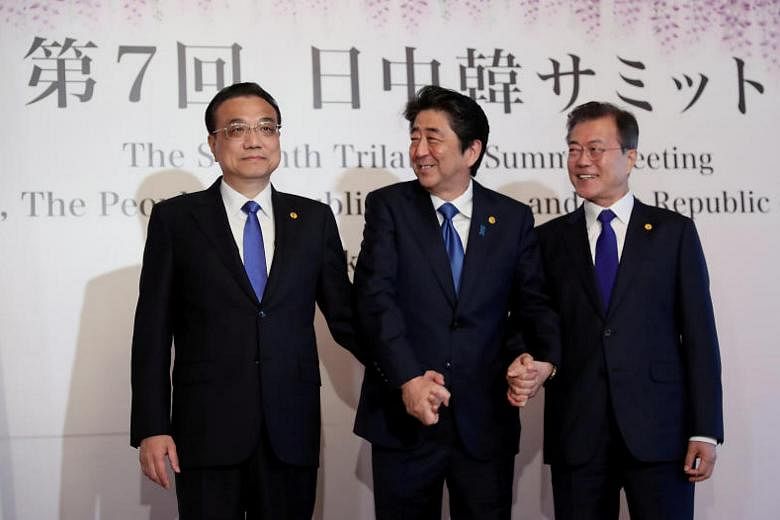Editorial China Daily
Although ties have been strained in recent times by their territorial and historical disputes, leaders of Japan, China and the Republic of Korea struck a more harmonious note in Tokyo this week.
Which is not surprising as the trilateral summit came hard on the heels of the positive progress that has been made in efforts to bring the Democratic People's Republic of Korea (DPRK) in from the cold. And the efforts Beijing and Tokyo had been making to build on their shared interests to kick-start their stalled relations.
Indeed, when Premier Li Keqiang, Japanese Prime Minister Shinzo Abe and South Korea President Moon Jae In sat down for talks, the portents for joint efforts to promote regional peace and stability and greater economic integration were the most promising they have been for years.
The fact that they reached a consensus on the need for complete denuclearisation of the Korean Peninsula and the permanent establishment of peace shows that there is common ground to be found.
And there is much the three neighbouring countries could achieve if they could shelve their differences and work together. Certainly in trade, where a tripartite free trade agreement is long overdue.
For despite the fact that their combined markets account for more than 20 per cent of the global gross domestic product, intra-regional trade among the three is only 20 per cent of their total trade.
Clearly there is much potential to be tapped.
And tapping that potential has become even more urgent in the face of the United States' protectionist stance on trade.
Reports that they have agreed to work towards finalising a free trade agreement and the proposed Regional Comprehensive Economic Partnership with South-east Asian nations hopefully mark progress towards realising what would give significant boosts to the regional economy. Li's Indonesia trip boosts strong ties
Editorial The Jakarta Post
The historic visit of Chinese Prime Minister Li Keqiang marks the fifth anniversary of the China-Indonesia Comprehensive Strategic Partnership and the 15th anniversary of the strategic partnership between China and Asean, the latter of which Indonesia is often regarded as the informal leader.
Bilaterally, China is committed to investing in Indonesia and helping to develop its much-needed infrastructure, which in turn will create jobs, especially for young Indonesians.
The strategic importance of Indonesia is evident in the fact that it is the first country visited by Mr Li during his second term as the Premier of the State Council of the People's Republic of China.
Previously, Mr Li visited Indonesia in December 2008 at the invitation of Vice-President Jusuf Kalla, during the first term of then President Susilo Bambang Yudhoyono.
Mr Li's current visit further enhances the strong economic foundations laid by President Xi Jinping during his visit here in October 2013, in his first year as president of the world's most populous country and currently the world's second-largest economy.
Indonesia plans to promote to China its agricultural products such as palm oil, coffee and cocoa as well as various tropical fruits including mangosteen, salak (snake fruit) and bananas.
China is Indonesia's third-largest investor with a total of US$3.36 billion (S$4.5 billion) last year, up from US$2.66 billion in 2016. However, Indonesia also wants to ensure that investments come with transfers of technology to add value to the labour force and to improve the environment.
There have been complaints that Chinese-funded projects entail not only capital and equipment but also Chinese workers, who take jobs that locals could easily fill. What is worse, many of the Chinese workers do not have proper work permits.
- The View From Asia is a compilation of articles from The Straits Times' media partner, Asia News Network, a grouping of 23 news media.

